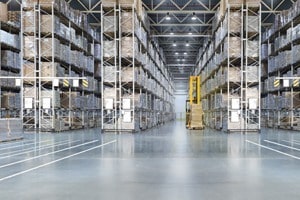What is materials management?
Materials management: the basis for optimal handling of material requirements
Ensuring smooth production is one of the fundamental tasks of an industrial or manufacturing company. Goods can only be produced and distributed without delay if an orderly flow of materials is guaranteed. The overarching term, which covers all tasks relating to the supply of materials, is materials management.
What is included in materials management?
In principle, companies differ greatly with regard to the organization and management of materials. For this reason, it makes sense to first describe materials management in the narrower sense.
Classic materials management: This includes all tasks with a focus on supplying the company; the aim here is to procure all raw materials, consumables and supplies as well as vendor parts. In essence, this is intended to ensure the fuel for production.
Integrated materials management: In a broader sense, the term refers to all of a company’s actions that are necessary to ensure the supply of materials to the business. This starts with procurement, continues with the handling of the material flow and ends with production and final delivery.
These subtasks characterize materials management
Since many areas of the company are affected by materials management functions, it is difficult to come up with a generally applicable organization. Depending on the type of company, the size of the business and its radius of action, different criteria come to the fore. In general, the main task of materials management is to ensure an optimal flow of goods – in terms of space, time, quality and quantity.
To provide a better overview of important subtasks, we have summarized the most important ones below:
- Management of goods flows
- Internal logistics
- Supplier selection
- Production planning
- Determination of requirements
- Distribution
What is integrated materials management?
Unlike the pure focus on material supply and procurement, which characterizes materials management in the narrower sense, integrated materials management is much more fundamental. This involves a holistic view of all functional areas that are related to materials. The basic idea is that this focus creates synergy effects that relate to the company’s own material supply, customer requirements and market mechanisms.
Within this area, a distinction is also made between different levels of integration, which are listed below:
“Integrated” materials management
In the basic scenario, the focus is on procurement and storage, transportation and disposal. The process is considered right up to the point at which materials find their way into production or finished products are dispatched. This form of materials management is the basic type and is used by many companies.
“Extended integrated” materials management
One integration level higher, the aim is to plan production holistically and make it controllable. All production tasks are explicitly integrated, which has the advantage that better handling is possible in procurement warehousing. This integration step is also a prerequisite for just-in-time (JIT) production.
“Totally integrated” materials management
The maximum degree of integration is achieved when coordination is also possible with regard to distribution. Consumer trends, sales-specific issues and other details play a role here. By using high-performance warehouse management software (WMS), it is possible to optimize capacity, reduce stock shortages and cut throughput times accordingly.
Concluding remarks
The difficulty of materials management lies in coordinating material and formal objectives in the best possible way. On the one hand, the aim is to cover material requirements to ensure production and delivery capability. On the other hand, shortages must be reduced, storage costs lowered and aspects of procurement optimized. The use of modern warehouse management software helps to analyze the flow of goods and draw conclusions about internal functional areas.
